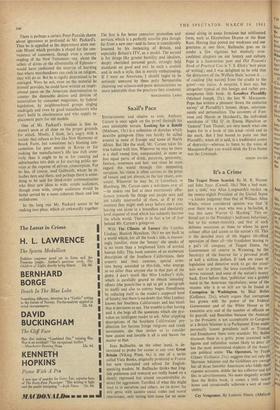Snail's Pace
ENTERTAINING and elusive as ever, Anthony Carson is once again on the prowl through his' own inimitable terrain. Looking for a Bandit (Methuen, 15s.) is a collection of sketches which describe goings-on (they can hardly be called events) in most of Europe and some of North Africa. But like the snail, Mr. Carson takes his true habitat with him. Wherever he may be there is a shell round him, compounded, in more or less equal parts, of drink, paranoia, generosity, fantasy, reverence and lust; and since he must regard the world through this interesting carapace, his vision is often curious to the point of lunacy and yet always, in the last resort, con- sistent. Wherever he may be, in Lavenham or Hamburg, Mr. Carson casts a weirdness over all —he makes one feel at once enormously affec- tionate towards the things and people seen and yet totally mistrustful of them, as if at any moment they might melt away before one's eyes, leaving one alone in a boundless and absolutely level expanse of mud which has suddenly become the whole world. There is in fact a lot of fear behind Mr. Carson's goings-on.
With The Climate of Lunacy (by Cynthia Lindsay; Hamish Hamilton, 18s.) we are back in a world which, for all the book's title, is reassur- ingly familiar, since the 'lunacy' she speaks of is no more than a heightened form of normal human folly. This book consists of an exuberant description of the Southern Californians, their country and their customs, special atten- tion being accorded to film-folk, who emerge as no sillier than anyone else in that part of the globe. I don't much like Miss Lindsay's style, which is carefully geared to obtain 'amusing' effects (the punch-line is apt to get a paragraph to itself) and also to convey bogus friendliness by reducing itself to the reader's supposed level of fatuity; but there is no doubt that Miss Lindsay knows her Southern Californians and has much that is pertinent to say. The trouble is that having said it she begs all the questions which she pro- vokes an intelligent reader to ask. After crippling descriptions of the Southern Californians' pre- dilection for furious fringe religions and crank movements, she then invites us to consider how quaint and lovable it all is and leaves the matter at that.
Jean Bailhache, on the other hand, is de- termined to probe for causes at any cost. Great Britain (Viking Press, (is.) is one of a series called Vista Books, originally produced in France but now translated and edited for English- speaking readers. M. Bailhache thinks that Eng- lish politeness and restraint are really based on a deeply repressed but almost uncontrollable in- stinct for aggression. Terrified of what this might lead to in ourselves and others, we tie down the evil genie with austere social codes and moral restrictions, only letting him loose for an occa- sional airing in some ferocious but sublimated form, such as Elizabethan Drama or the Boat Race. Having thus potted our weakness and our greatness at one blow, Bailhache goes on to render a few vigorous but similarly over- confident chapters on our history and culture. Pope is a humourless poet and Old Possum's Book of Practical Cats is T. S. Eliot's 'best piece of writing'; and I was delighted to be told that the detractors of the Welfare State 'accuse it ... of codding [the nation] from the cradle to the grave'—my italics. A misprint, I dare say, but altogether typical of this benign and rather pre- sumptuous little book. In Goodbye Piccadilly (Michael Joseph, 25s.), the late W. Macqueen- Pope has written a pleasant 'down the centuries survey' of Piccadilly's houses, shops, entertain- ments and personalities. The accounts of Fort- num and Mason or Hatchard's, the individual anecdotes of 'Old Q' or Emma Hamilton or 'General' Torn Thumb, are very much what one hopes for in a book of this kind—vivid and to the mark. But I feel bound to point out that Piccadilly, when all is said, is a traditional centre of depravity—whereas to listen to the voice of Macqueen-Pope you would think the Eros Statue was the Cenotaph.






































 Previous page
Previous page